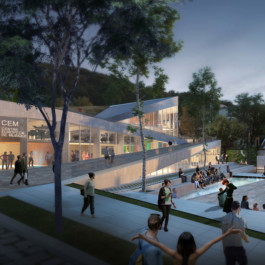


Music is not merely a pastime: it is a vital force, a remedy, a social cement. Faced with the urgency of our time, the Centre Européen de Musique (CEM) launches Music Now! Musica Nostra!, a true rallying cry to mobilize immediately the power of music in service of the Sustainable Development Goals (SDGs) of the 2030 Agenda. For every SDG, there is a possible musical response. Our approach is global and transdisciplinary: musicians, researchers, decision-makers and field actors unite to reveal the full societal impact potential of music. Together, let us make the urgency to act… now!
Since its origins in the early 2000s, the Centre Européen de Musique (CEM) has worked to make music a lever for social and cultural innovation. Far more than simple entertainment, it contributes to well-being, the learning of otherness, cohesion between generations and the emergence of solidarity projects.
Our ambition is to launch concrete, large-scale actions so that everyone can benefit from the unifying and transformative power of music. Since 2022, we have been developing a network of European branches to implement our actions: Paris; Mafra (six Portuguese towns combined); and others currently in development in Spain, Austria, Germany and Greece.
The CEM builds bridges among all actors in the musical world: composers, performers, musicologists, neuroscientists, philosophers, policymakers and association leaders. By bringing together these complementary expertises, we foster the design of projects rooted in scientific research, useful in daily life and carrying an inclusive vision.
The CEM thus positions itself as an incubator for musical projects with societal and cultural missions, under the brand viamusica®, to innovate and amplify music’s positive impact.
From the Villa Viardot to Bizet’s house, the CEM is committed to safeguarding emblematic sites and works, as well as transmitting oral practices, know-how and artistic traditions. This approach encompasses both tangible heritage—buildings, objects, documents—and intangible heritage, such as performance styles, oral compositions or creative rituals in the context of this conservation work.
Through events, cultural trails and exhibitions, we advocate for this shared heritage to remain a wellspring of creativity and exchange for future generations. As a founding member of the European Heritage Hub (an EU pilot project), the CEM develops digitization initiatives to make this heritage accessible to the widest audience and multiply opportunities for transmission and research.
Alongside our institutional and academic partners, we develop scientific studies and programs exploring the benefits of music practice for health, education and biodiversity preservation. The CEM also encourages knowledge transfer and the professional development of young musicians in Europe through masterclasses, artist residencies and integration programs.
We are convinced that training and artistic excellence are passports to each individual’s fulfillment. Several programs are under development, notably MU-SE in partnership with the Menuhin Foundation. The CEM is also responsible for rolling out the MUS-E program in France.
By interconnecting the musical heritages of different countries, supporting transnational initiatives and multiplying collaborations, the CEM promotes a sense of common belonging. Music is a universal language that brings people together, facilitates dialogue and contributes to democratic stability.
We therefore work to ensure that the European dimension of music unfolds on the ground, while remaining attentive to today’s social and environmental challenges.

Architecture design proposal (© Linkcity, D&A, Snøhetta)
The CEM’s « Pauline Viardot » Academy of Music will offer annual sessions for students, sanctioned by a diploma with a truly European reach; the curriculum will be based on innovative teaching methods with a focus on preparing students for professional integration.
Four subjects will be covered: instruments, singing, chamber music and conducting.
The Academy will promote a broader scope of knowledge through a cross-disciplinary approach to musical expression and its multiple links with the arts, humanities and sciences.
At the European Commission’s request, « Erasmus + » will be extended to professional music, and the CEM will host the new programme.
The proposed curriculum will offer students the freedom to express themselves and develop their talents across the campus.
Programming for the 500-seater « Georges Bizet » auditorium will be equally shared between student presentations and concerts and high-profile performances by the world’s top artists in a variety of musical genres.
In addition, the House of Georges Bizet, a place steeped in history particularly conducive to creation, will host three artists in residence every year in a partnership with the Yvelines regional authorities.
The « Yehudi Menuhin » Agora of Musical Cultures and Traditions will serve as a forum to hear, display and promote the musical wealth of human history and enhance its heritage. It will serve as a major centre for the preservation of the world’s endangered musical heritage.
On the CEM grounds, an intergenerational residence will welcome both retired musicians and students. This unique configuration will promote exchanges for the benefit of creativity, solidarity and knowledge transmission.
CEM students will also be trained in cultural mediation and art therapy in order to fully take on their social function as both artists and committed citizens.
The « Espace Carmen » will serve as both a reception area and a space for memories, displays and transmission dedicated to the life and work of Georges Bizet.
In cooperation with leading international research institutions, the CEM laboratory will benefit from direct proximity with musicians and artists.
It will offer scientists from around the world unique surroundings dedicated to the development of scientific and medical knowledge around music, with a specific focus on brain plasticity, learning and memory.
The laboratory will be complemented by therapeutic and athletic facilities which, through music, will serve to promote the development of preventive and curative methods for the treatment of autism, pathologies linked to the practice of music, or even neurodegenerative diseases such as Parkinson’s and Alzheimer’s.